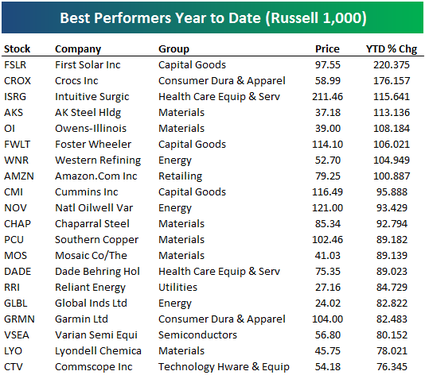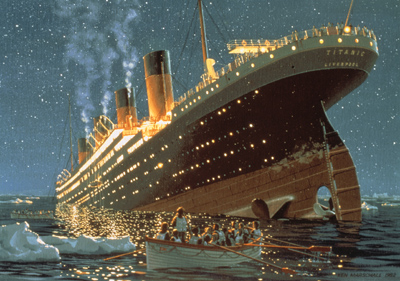-
Renaissance to Pursue Private Offering
Posted by Eddy Elfenbein on August 28th, 2007 at 9:00 amFrom the FT:
Renaissance Technologies, one of the world’s biggest hedge fund groups, has shrugged off concerns about volatile global markets and is considering a partial float.
The $30bn (£15bn) group run by billionaire mathematician James Simons had held discussions about selling shares to sophisticated investors through a private trading network set up recently by a group of investment banks.
The move suggests that Renaissance believes that the recent crisis in the US credit markets and the global flight to safety among investors will be short-lived and that there will be ample opportunity for the hedge fund to continue to earn its historically high returns.
Renaissance believes that there will be strong demand for its shares from big US institutions and foreign investors such as governments in Asia and the Middle East.
The bullishness shown by Renaissance comes as hedge fund groups such as AQR and private equity firms including KKR are proceeding cautiously with planned initial public offerings.
However, those groups are contemplating full listings available to all investors that must be registered with the Securities and Exchange Commission. Renaissance is considering a so-called 144A listing that would not be registered and would be available only to institutional and other sophisticated investors.
The highly secretive Long Island-based group is considering this route because it would not be forced to publicly reveal significant information about its trading strategies and it believes it would be more likely to attract more long-term investors.
The shares would trade on a system called Opus 5, launched this month by Morgan Stanley, Lehman Brothers, Citigroup, Merrill Lynch and the Bank of New York Mellon.
The consortium platform is intended to compete with existing markets for private placements set up by Bear Stearns, Goldman Sachs and JPMorgan. Friedman, Billings, Ramsey has also been a big user of the 144A market. A Renaissance official could not be reached for comment. Talks about a sale are at a sensitive stage and could still stall, however the shares could be sold as early as next month.
It is not yet clear what size of stake Renaissance would sell in the offering but it is assumed that current management will retain control of the group.
Fortress Investment Group, the hedge fund and private equity firm that went public this year, manages about $43bn and has a market value of about $7.3bn. -
Topps Calls ‘Time’ on a Vote
Posted by Eddy Elfenbein on August 28th, 2007 at 8:43 amWho knew the baseball card biz could be filled with such high drama? Topps (TOPP) has now delayed the vote on the $385 million takeover offer from Michael Eisner’s Tornante. Last week, Upper Deck pulled out of the bidding.
The move is to allow Topps stockholders to “evaluate recent developments when deciding how to vote their shares,” Topps said. It said that had the vote taken place as scheduled, the Tornante deal likely would have failed to win a majority of the shares needed for its approval.
Topps urged shareholders in a letter to support the $9.75-a-share cash deal with Tornante, which is owned by former Walt Disney Co. Chief Executive Michael Eisner and Madison Dearborn Partners LLC.
However, two proxy advisory firms, Institutional Shareholder Services and Glass Lewis, have urged Topps holders to reject the Eisner-Madison deal, which also was opposed by Crescendo Advisors LLC.Upper Deck had offered $10.75 a share but Topps said that offer was “a sham.” Considering that shares of TOPP haven’t done much for about 15 years, I’d want them to take any offer, sham or not.
-
Top Peformers of the Year
Posted by Eddy Elfenbein on August 28th, 2007 at 8:36 amBespoke Investment Group lists the top-performing stocks of the year from the Russell 1000:

-
Not Exactly Hard on the Eyes
Posted by Eddy Elfenbein on August 27th, 2007 at 4:16 pm
Erin Burnett, aka the Street Sweetie, gets a 2,000-word love letter from Howie Kurtz in today’s Washington Post:Less than two years after joining the business channel, Burnett is everywhere, from “NBC Nightly News” to “Hardball.” She’s been praised by Rush Limbaugh, mocked by Jon Stewart and ogled by Chris Matthews.
The 31-year-old is razor sharp, works crazy hours, is comfortable discussing liquidity or collateralized debt obligations — and everyone keeps talking about her looks. Under the lights, in a smoky blue dress that matches her eyes as well as her shoes, her flowing dark hair perfectly teased, she is not exactly hard on the eyes.Sheesh, get a room!
-
First Ever Drop for Home Prices
Posted by Eddy Elfenbein on August 27th, 2007 at 4:02 pm
For the first time on record, home prices are expected to show a decline:The already rough real estate market may be about to get bumpier.
Economists predict a government report due out Thursday will show a national drop in the median price of single family homes since last year. If economists are right, it will be the first time that’s ever happened.
“Cumulatively, prices should fall somewhere between five and 10 percent nationwide,” said economist Mark Zandi.
The median price for a single-family home is currently $223,800. The median price is the number midway between the least expensive and most expensive houses sold in a given period.
Zandi says too much inventory, weak demand and tighter credit have been problems in some markets for two years.
“Well over half the country is now experiencing price declines and will experience further price declines through this time next year into 2009,” Zandi said. “That’s unprecedented.”
In Reno, home prices are down more than 6 percent from a year ago and are expected to drop close to 11 percent in the next year.
Minneapolis prices are down 2.6 percent from last year.
And in Hartford, home prices are down more than 5 percent from a year ago and are expected to fall further.
But the price slump hasn’t spread everywhere. Home prices are up in places like Charlotte and Austin.
With home prices dropping in so many areas, many families could lose a big financial cushion—their home equity.
“For those homeowners who bought in over the last couple of years, that piggybank is broke,” Zandi said. “There is no cash the to pull out because house prices have been declining and they have no equity in their home.” -
Debt Issues Top Economists’ Fears
Posted by Eddy Elfenbein on August 27th, 2007 at 11:02 amI’m not sure if this is for or against the credit crunch story, but it now tops a poll of economists’ fears about the economy:
The combined risk of mortgage defaults and heavy debt loads has overtaken terrorism as the biggest short-term threat to the U.S. economy, according to a survey of economists being released today.
The National Association for Business Economics says almost a third of its survey respondents listed debt-related problems as their top worry: About 18% cited the effects of subprime-loan defaults and 14% listed excessive household or corporate debt.
About 20% of the 258 members responding put defense concerns and the possible economic disruption of a terror attack at the top of their list, down from 35% in the group’s March survey. Energy prices were the top-cited risk among 13% of the group, which largely includes economists working at U.S. corporations or with think tanks and universities.
The poll results, collected from July 24 to Aug. 14, reflect early worries about the turmoil spreading through equity and debt markets in recent weeks. Defaults tied to riskier home loans soared this year, devaluing mortgage-backed securities and spurring a pullback from many lenders. The ensuing crisis has spurred worries of cutbacks in business and consumer spending.The second-quarter GDP report will be revised later this week. It will be interesting to see how well the economy did. The initial report said the economy grew by 3.4%. I wouldn’t be surprised to see that number adjusted higher.
-
Minesweeper the Movie
Posted by Eddy Elfenbein on August 24th, 2007 at 5:30 pm -
Wall Street and the Family Feud
Posted by Eddy Elfenbein on August 24th, 2007 at 10:05 am
From the Web site, the worst Family Feud Answers:Question: Name the worst kind of shoe to run a marathon in.
#1 Answer: High heels
Worst Answer: Scuba flippers
Louie Anderson’s Response: If it’s up there… I’ll be surprised.There’s something fascinating about the game show the Family Feud. You don’t have to give the best answer, or the funniest answer. You don’t even need to give a correct answer. All you need to do is give the answer everyone else gives. The show rewards people for being exactly like the largest amount of other people. Anything exceptional is not only discouraged, it’s actively punished.
I couldn’t help but think of the show as I read this WSJ article on why so many quant funds are having trouble:A number of quant funds, which use statistical models to find winning trading strategies, reported heavy losses this month. In many cases, the managers pointed their fingers at other quantitative hedge funds, essentially saying they all owned many of the same stocks and their models told them all to sell at the same time, driving down the share prices, hurting everyone in the process.
In a letter to investors, Jim Simons of the hedge fund Renaissance Technologies wrote the quantitative funds behind the selling “undoubtedly share some signals in common with our own, and the result has been losses.” It didn’t help that quant funds are among the fastest expanding categories of hedge funds.In other words, a lot of folks are running down Wall Street in scuba slippers.
Filings with the Securities and Exchange Commission show that as of the end of June, quantitative hedge funds often shared large positions in the same stocks. Renaissance held 1.1% of the shares outstanding of NVR Inc., a Virginia construction and home-building company. AQR Capital Management, another quant fund, held 0.9% of the company’s shares and quant fund Numeric Investors had a 1.6% stake.
NVR stock, which closed yesterday at $571 a share, trades less than most companies of its size. The shares have bounced higher since the selloff, but they are off 8.4% over the past month.
The overlap in quant funds’ positions wasn’t limited to NVR. Satya Pradhuman, director of research at Cirrus Research, which analyzes small and midsize stocks, found 148 other companies with market capitalizations between $2 billion and $10 billion where large quant funds owned 5% or more of the shares outstanding.
As a whole, those companies’ shares underperformed the shares of other midcap stocks during the selloff. Mr. Pradhuman found 473 small-cap stocks, with market capitalizations of $250 million to $2 billion, where the quant funds owned 5% or more of the shares outstanding. These stocks also performed worse than other similar stocks.
The midcap companies where quant funds held big stakes included packaging company Pactiv Corp., toy maker Hasbro Inc. and managed care provider WellCare Health Plans Inc. Small caps included printer Deluxe Corp., consumer-products company Russ Berrie & Co. and health-care equipment maker Zoll Medical Corp.The Life of Brian:
Brian: Please, please, please listen! I’ve got one or two things to say.
The Crowd: Tell us! Tell us both of them!
Brian: Look, you’ve got it all wrong! You don’t NEED to follow ME, You don’t NEED to follow ANYBODY! You’ve got to think for your selves! You’re ALL individuals!
The Crowd: Yes! We’re all individuals!
Brian: You’re all different!
The Crowd: Yes, we ARE all different!
Man in crowd: I’m not… -
Intangible Wealth
Posted by Eddy Elfenbein on August 24th, 2007 at 9:49 amReason has a fascinating interview with Kirk Hamilton on what really makes a country wealthy, its intangible wealth. This is from the intro:
Oil, soil, copper, and forests are forms of wealth. So are factories, houses, and roads. But according to a 2005 study by the World Bank, such solid goods amount to only about 20 percent of the wealth of rich nations and 40 percent of the wealth of poor countries.
So what accounts for the majority? World Bank environmental economist Kirk Hamilton and his team in the bank’s environment department have found that most of humanity’s wealth isn’t made of physical stuff. It is intangible. In their extraordinary but vastly underappreciated report, Where Is The Wealth Of Nations?: Measuring Capital for the 21st Century, Hamilton’s team found that “human capital and the value of institutions (as measured by rule of law) constitute the largest share of wealth in virtually all countries.” -
Not a Good Day for Pro Athletes’ Investments
Posted by Eddy Elfenbein on August 23rd, 2007 at 3:02 pmFirst, we learn that Joe Montana’s hedge fund was down 12% in August.
Now, we hear that Latrell Sprewell had his 70-foot yacht seized. Apparently, he’s behind on his mortgage payments.
-
-
Archives
- April 2025
- March 2025
- February 2025
- January 2025
- December 2024
- November 2024
- October 2024
- September 2024
- August 2024
- July 2024
- June 2024
- May 2024
- April 2024
- March 2024
- February 2024
- January 2024
- December 2023
- November 2023
- October 2023
- September 2023
- August 2023
- July 2023
- June 2023
- May 2023
- April 2023
- March 2023
- February 2023
- January 2023
- December 2022
- November 2022
- October 2022
- September 2022
- August 2022
- July 2022
- June 2022
- May 2022
- April 2022
- March 2022
- February 2022
- January 2022
- December 2021
- November 2021
- October 2021
- September 2021
- August 2021
- July 2021
- June 2021
- May 2021
- April 2021
- March 2021
- February 2021
- January 2021
- December 2020
- November 2020
- October 2020
- September 2020
- August 2020
- July 2020
- June 2020
- May 2020
- April 2020
- March 2020
- February 2020
- January 2020
- December 2019
- November 2019
- October 2019
- September 2019
- August 2019
- July 2019
- June 2019
- May 2019
- April 2019
- March 2019
- February 2019
- January 2019
- December 2018
- November 2018
- October 2018
- September 2018
- August 2018
- July 2018
- June 2018
- May 2018
- April 2018
- March 2018
- February 2018
- January 2018
- December 2017
- November 2017
- October 2017
- September 2017
- August 2017
- July 2017
- June 2017
- May 2017
- April 2017
- March 2017
- February 2017
- January 2017
- December 2016
- November 2016
- October 2016
- September 2016
- August 2016
- July 2016
- June 2016
- May 2016
- April 2016
- March 2016
- February 2016
- January 2016
- December 2015
- November 2015
- October 2015
- September 2015
- August 2015
- July 2015
- June 2015
- May 2015
- April 2015
- March 2015
- February 2015
- January 2015
- December 2014
- November 2014
- October 2014
- September 2014
- August 2014
- July 2014
- June 2014
- May 2014
- April 2014
- March 2014
- February 2014
- January 2014
- December 2013
- November 2013
- October 2013
- September 2013
- August 2013
- July 2013
- June 2013
- May 2013
- April 2013
- March 2013
- February 2013
- January 2013
- December 2012
- November 2012
- October 2012
- September 2012
- August 2012
- July 2012
- June 2012
- May 2012
- April 2012
- March 2012
- February 2012
- January 2012
- December 2011
- November 2011
- October 2011
- September 2011
- August 2011
- July 2011
- June 2011
- May 2011
- April 2011
- March 2011
- February 2011
- January 2011
- December 2010
- November 2010
- October 2010
- September 2010
- August 2010
- July 2010
- June 2010
- May 2010
- April 2010
- March 2010
- February 2010
- January 2010
- December 2009
- November 2009
- October 2009
- September 2009
- August 2009
- July 2009
- June 2009
- May 2009
- April 2009
- March 2009
- February 2009
- January 2009
- December 2008
- November 2008
- October 2008
- September 2008
- August 2008
- July 2008
- June 2008
- May 2008
- April 2008
- March 2008
- February 2008
- January 2008
- December 2007
- November 2007
- October 2007
- September 2007
- August 2007
- July 2007
- June 2007
- May 2007
- April 2007
- March 2007
- February 2007
- January 2007
- December 2006
- November 2006
- October 2006
- September 2006
- August 2006
- July 2006
- June 2006
- May 2006
- April 2006
- March 2006
- February 2006
- January 2006
- December 2005
- November 2005
- October 2005
- September 2005
- August 2005
- July 2005
 Eddy Elfenbein is a Washington, DC-based speaker, portfolio manager and editor of the blog Crossing Wall Street. His
Eddy Elfenbein is a Washington, DC-based speaker, portfolio manager and editor of the blog Crossing Wall Street. His